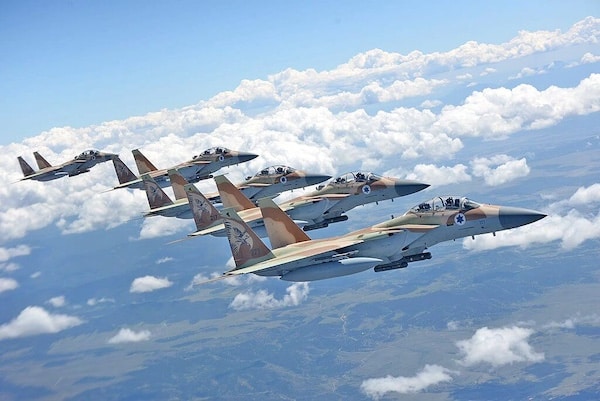War between Israel and Hezbollah could be on the verge of escalating dramatically — and the mainstream media is characteristically under- and mis-reporting the rising danger.
An irresponsible anonymous article on the British Telegraph’ s news website even raised fears that Israel might be planning to attack Beirut’s airport, which would send dangerous shock waves across the entire region, possibly bringing Iran into the conflict. Meanwhile, though, a selfish, dishonest Benjamin Netanyahu would personally benefit from a wider war — a point that many Israelis don’t hesitate to make but which the U.S. press ignores.
The widely-noted June 23 article on the Telegraph’s site is clearly dangerous. It claimed, with zero evidence, that Hezbollah “is storing huge quantities of Iranian weapons, missiles and explosives in Beirut’s main civilian airport.” It cited anonymous “whistleblowers” at the airport, and it even seemed to be egging on the Israeli military with this coy sentence:
the disclosures will raise fears that the Rafic Hariri airport, just four miles from the city center, could become a military target.
The article triggered a storm of condemnations, including from other journalists. Abbie Cheeseman, a former Telegraph reporter in the region, said she “stopped working for the Telegraph last month and had no prior knowledge of this wildly irresponsible story until it appeared today.” Gregg Carlstrom, the Mideast correspondent for the conservative Economist, called the article “a shoddy bit of political messaging,” and added:
I’d love to know the backstory of whom at the Telegraph decided to publish something so transparent that no one. . . was willing to put their name to it.
So far, the U.S. media seems to be ignoring the Beirut airport story.
Otherwise, though, the American mainstream is distorting the rising danger of regional war. The Washington Post’s June 23 sub-headline is just one example:
Fears are growing that border clashes between Israel and the Lebanese militant group Hezbollah could escalate into an all-out war, consuming the Middle East.
The headline is narrowly accurate but misleading. Those “border clashes” are nothing new. They started right after October 7, and there has been an uneasy stalemate since then. What did change in recent weeks is buried down in paragraph 13 in the Post’s report; on June 11, Israel assassinated Taleb Sami Abdullah, a high-ranking Hezbollah commander. Another senior Hezbollah official promptly promised retaliation, “in severity, strength, quantity and quality.” The New York Times is also giving insufficient attention to Israel’s provocative killing. The paper, to its credit, did report Abdullah’s killing the day it happened, but in a longer June 18 survey of the rising tensions his death is hidden in paragraph 13.
National Public Radio was even worse. A June 20 report included an interview with Jane Arraf, the NPR correspondent who is in Beirut — but she never once explained that Israel’s assassination of Abdullah is what has raised the threat of war. Arraf said Hassan Nasrallah, the Hezbollah leader, had spoken for more than an hour the day before, “in his hardest-hitting remarks since the war in Gaza began last October.” She added that Nasrallah said that “Hezbollah did not want to go to war, but he warned that there was a possibility that that’s what the current fighting could slide into.”
Surely during that hour the Hezbollah leader must have also condemned Israel’s killing of Abdullah, which had happened only 9 days earlier — but Arraf inexplicably left that fact out.
The next day, NPR produced an even more biased report headlined: “Could Israel’s Iron Dome missile defense system hold up in a war with Hezbollah?” The 4-minute report sounded like an advertisement for Iron Dome. The implication was that Hezbollah was the potential aggressor, and Israel the innocent victim. (Of course, NPR didn’t ask Jane Arraf in Lebanon to find out how Lebanese people would protect themselves from Israeli rockets and airstrikes.)
Israel’s killing of Abdullah is almost an exact replay of its last provocative escalation — the April 1 aerial assassination in Damascus of a high-ranking Iranian general, which then prompted Iran’s telegraphed missile barrage against Israel.
Why would Israel, which is bogged down in Gaza, once again risk a wider regional war? There is a two-word answer: Benjamin Netanyahu.
Large numbers of Israelis do not hesitate to indict Netanyahu for putting his political survival ahead of what’s good for the country, especially because if he loses office, he goes on trial for corruption and could end up in jail. The two members of his war Cabinet who might have mildly restrained him have left it, and so now he’s completely surrounded by ministers who are nearly as desperate to hold on to power as he is. Relatives of the Israelis held captive in Gaza accuse him in angry street demonstrations of putting himself first; all any American reporter would have to do is quote a couple of them. But the U.S. media is, for some reason, too squeamish to tell the truth.

